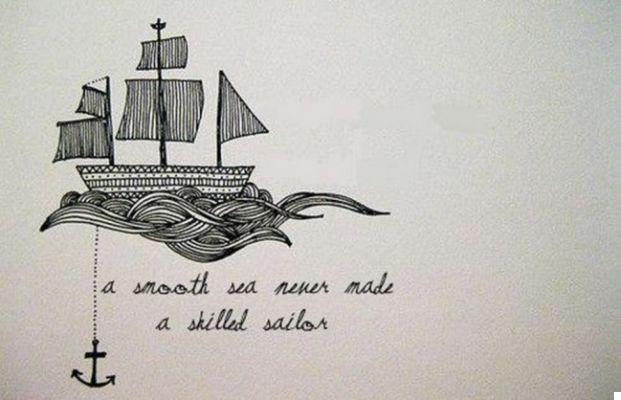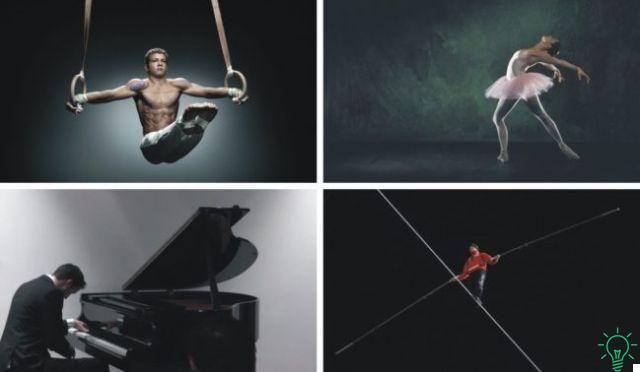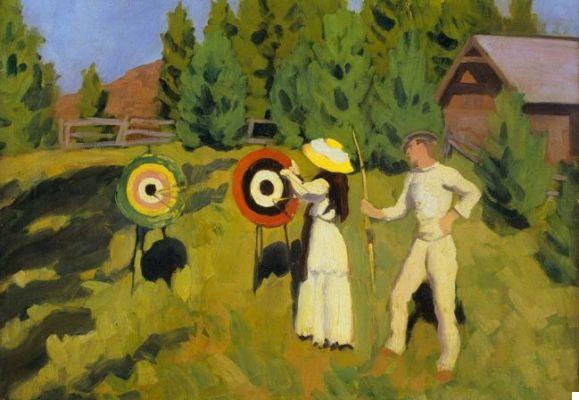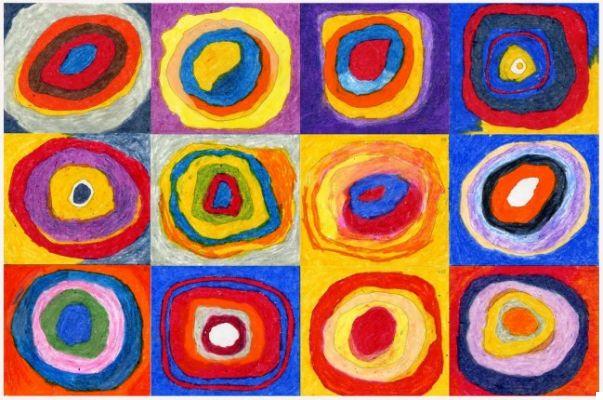
Develop talent is within the reach of all: no one should believe they don't have unexpressed potential. In each of us there is a sleeping giant to awaken. Whatever talent you intend to develop - play a musical instrument, play a sport, learn a new language, lead a startup - you were born with the necessary equipment to transform the initial unpreparedness - typical of all beginners - in effective skills.
This is equipment that is not controlled by the genes, but by you. Every constructive action you take, every life experience, every practice session is a step that brings you closer to developing your talent.
The misunderstanding of innate talent
But why is it usually thought that talent is innate? First of all why often those who emerge and assert themselves as a "talent" start dedicating themselves to their passions as a child, pushed to deepen them by parents and / or educators who support and support him. This initiative, due to its precocity, is mistakenly mistaken for an innate spark. But nowhere is it written that new skills cannot be learned in adulthood! Furthermore, the misunderstanding of innate talent also arises from the fact that the expression of a talent is not the same in every person. Not all those who engage in any discipline become "great" in their field. But the difference between who remains only a good performer and who becomes a "genius" is not a genetic question. What affects and contributes in a decisive way to forming talented people are study, hard work, practice, self-denial, application, discipline. In short, talent does not come out on its own, it needs to be constantly cultivated, day by day.
We are what we repeatedly do. Therefore excellence is not an action, but a habit.
Aristotle
How to develop talent: 40 practical, simple and effective strategies to take full advantage of your unspoken skills
- Observe and carefully analyze who you want to become. No one is better than you: if someone else has made it, you can too! Get inspired by the people you admire by focusing on their work.
- Emulate top performers by imitating their techniques, style and all the information necessary to increase your skills. Success is often achieved by retracing winning and tested models. As Pablo Picasso said: “Good artists borrow; great artists steal. "
- Use an agenda to record your achievements, goals, and ideas. Write lists and think about them: this generates clarity.
- Be willing to make mistakes and take risks. Try without letting yourself be held back by the fear of feeling stupid. Consider mistakes as waypoints to improve yourself, and never as failures.
- Choose austerity. A humble environment usually provides a noticeable motivational drive to improve and allows you to stay focused on performing tasks. On the other hand, being surrounded by ease and comfort leads to relaxation and distraction.
- Before starting a business, consider whether specific technical skills are required or not. This will allow you to understand which approach to use: if you need exact, precise, reliable and error-free skills, then you need a coach / teacher / mentor; if instead more flexible and generic skills are required, you can practice with direct practice without external help.
- When choosing a coach / teacher / mentor avoid someone who focuses their efforts on making you feel comforted and in making things go smoothly as if you don't have to worry about a thing. Look for someone who empowers you with their authority. Look for someone who gives practical, short and precise directions (no long sermons). Look for someone who loves teaching the fundamentals and who is willing to pass on their "secrets" to you. Finally, all things being equal, choose the most experienced or senior.
- Identify the crux: This is a point at the limit of your skills where you can improve faster and more effectively. At the crux you should feel completely involved and strained, as if you are struggling to reach an unattainable goal. Finding your crux is one way to grow - once you've established the boundaries of your skills, aim just a little further.
- Do not measure practice and exercise by time, but by the quantity and quality of the sessions. For example, if you want to practice the piano instead of thinking: “I'm practicing for 20 minutes”, you say to yourself: “I'm going to do 5 intensive rehearsals of the new composition”.
- Break each goal into small steps. However big the sun is, it is still the composition of single and small rays. No matter how long a book is, it is still the composition of individual letters of the alphabet. A ray of sunshine or a letter of the alphabet are "chunks" or small, non-decomposable units. Ask yourself what is the smallest element of the skill you intend to develop and work on it, trying to make the most of it so that it is performed flawlessly.
- Embrace the fight. When it comes to developing a talent, struggle is not an optional element, but a necessity. Remember: no sacrifices, no gains. In short, there are no free lunches.
- Do a little every day and not so much once a week. Small daily practice sessions are more effective than weekly sessions. Better to do a little and repeat it every day rather than do a lot and repeat it occasionally. In addition, repeated practice day after day helps turn an act into a habit.
- Don't just do simple exercises, but always try to turn your daily practice into something playful, fun and exciting. Talent requires a lot of passion and cannot be expressed by relying solely on a mechanical and cold execution. For example, you could keep track of the results you achieve and challenge yourself to improve performance. This will turn the tutorial into a game.
- Practice on your own. If you work on your skills alone you can better understand what your limits are and how to overcome them. Furthermore, by not counting on anyone else, you also develop more discipline.
- Think in pictures. Images are much easier to remember, grasp and apply. Think about carrying out your exercises with images that are easy to see and hear.
- Pay close attention to mistakes after making them. Even if your instincts tell you to belittle or ignore the mistakes you make, always try to learn from the mistakes by focusing on them. Analyze the mistakes looking reality in the face and ask yourself what you need to do next time to improve.
- Reduce the physical space available to you to train. Smaller spaces can increase the effectiveness of exercises if they serve to increase the number and intensity of repetitions and to clarify the goal.
- Slows. When you learn a new skill you are pushed to go faster and faster. Speed, however, also leads to making inaccuracies. Slow practice works like a magnifying glass - it makes you perceive mistakes more clearly and helps you correct them.
- Close your eyes. One of the simplest ways to deepen a practice is to close your eyes. This is to improve self-awareness, wipe out sources of distraction and focus more on your skills.
- Mima. It may sound crazy, but if you mimic the gestures of the practice you are dedicating to you, you keep practicing even if you are not practicing!
- Focus on the first time you hit the bull's-eye. When you realize that you have been able to express a flawless skill for the first time, pause and rewind the tape of your mind thinking about the move you made. Memorize the rhythm, emotions and sensations experienced. Make this point because it is an achievement that you must learn to repeat.
- Rest and take naps. Before starting a practice session you should rest so that you can face the exercise in the ideal form. Napping also helps the mind stay focused and improve learning.
- To learn a new move, overdo it. Don't be shy or hesitant: if there is an exercise you need to perform, emphasize it. Always push yourself a little further so that you can test the limits of your abilities. You can always rebalance things later.
- Think positively. Whenever you have to perform a task you can decide whether to focus mentally on achieving the goal or on the possible error. Always try to focus on the positive move, not the negative one.
- Never look for the easy way out. Often less effort also means less learning.
- Reinforce the right move. Deep practice has to do with identifying and eliminating mistakes. A practice session to practice not making mistakes involves doing the right thing, making the wrong move, and doing the correct move again. The goal is to reinforce the right move by turning a spotlight on the mistake so that it is "marginalized".
- Repeat an exercise three consecutive times with a ten-minute interval between each repetition.
- Stop before you are exhausted. Learning is never effective when experiencing a state of exhaustion. Exercise if possible in the morning: the early hours of the day guarantee you greater concentration and attention.
- Practice immediately after the performance. Usually after performing you rest, and postpone training until the next day. Instead, the best time to train - provided you are not exhausted - is right after a performance. This helps you identify your weaknesses and remedy them.
- Before falling asleep, make a movie in your mind. When you go to bed in the evening, visualize a movie in your mind that reproduces your best performance. Visualization serves to ignite the engine of the unconscious mind to help you achieve your goals.
- Reward yourself. Whenever you finish a practice session, treat yourself to a reward: a meal, a game, a small prize. In short, whatever can be a positive and rewarding note for you.
- Devote yourself to repetition. Repetition usually has a bad name: it is boring, mechanical, unintelligent and uninspiring. Yet it is powerful: it is certainly the best leverage you have available to develop talent. Don't scorn repetition as a routine; rather appreciate it as your most powerful tool.
- Trust a worker mentality. Seen from afar, the top performers seem to live a fascinating and comfortable life. If you look at them closely, however, you realize that they spend their days practicing a lot. They work hard and intensely every sacrosanct day, whether they like it or not.
- Practice more and less competition. Races are usually fun. When you play it is more exciting and exciting, but it also slows down the development of skills. For each competition do at least 5 practice sessions to train your talent.
- Replace old and bad habits with new and good ones. If you have bad habits and try to fight them, you are sure you will never get rid of them permanently. Habits are really hard to change. One effective thing you can do is create new habits that overlap old ones. To build a new habit, start slowly and gradually build commitment. Don't worry if you feel a little awkward, stupid, or frustrated at first; this is physiological.
- To learn something better, teach it. If you see that there is someone who has difficulty learning the same skills as you do, don't hesitate to help them by teaching them what you have learned. This will improve your ability to cope with difficulties.
- Be patient. You can't develop talent in a short time. You must always consider a minimum time frame of two months to start learning new skills. So don't be disheartened if you don't see the improvements you want at first.
- If you get stuck, make a change. Who hasn't ever started a new path and got stuck at some point? When you experience this state it speeds things up - you force yourself to do the task faster than you normally would. Or slow down: Going much slower than before you may be able to see mistakes that you missed. Or again: reverse the order of the tasks. In short, opt for some changes!
- Be brave. Courage is what unites passion, perseverance and self-discipline allowing you to deliver an additional performance. Courage is not innate - you can develop it by starting with awareness. Start identifying all those moments in your life when you have had courage and celebrate them.
- Keep your goals secret. While it's natural and very inviting to announce your big goals, it's much smarter to keep them to yourself. This way you don't waste the energy needed to make them happen.
Conclusions
I hope mine tips for developing talent can help you whatever the area in which you intend to develop new skills: sport, music, art, science, business. Even if the talent grows slowly, and with small and daily repetitions, anyone can achieve extraordinary goals. Sure, you will encounter challenges, difficulties, stopping points, steep climbs, demotivation. Don't let it get you down: I don't think you would blame a little acorn because it hasn't become a big oak yet. Well, do the same with yourself: don't complain because your talent is still developing. Cultivate it with practice by working diligently.

























